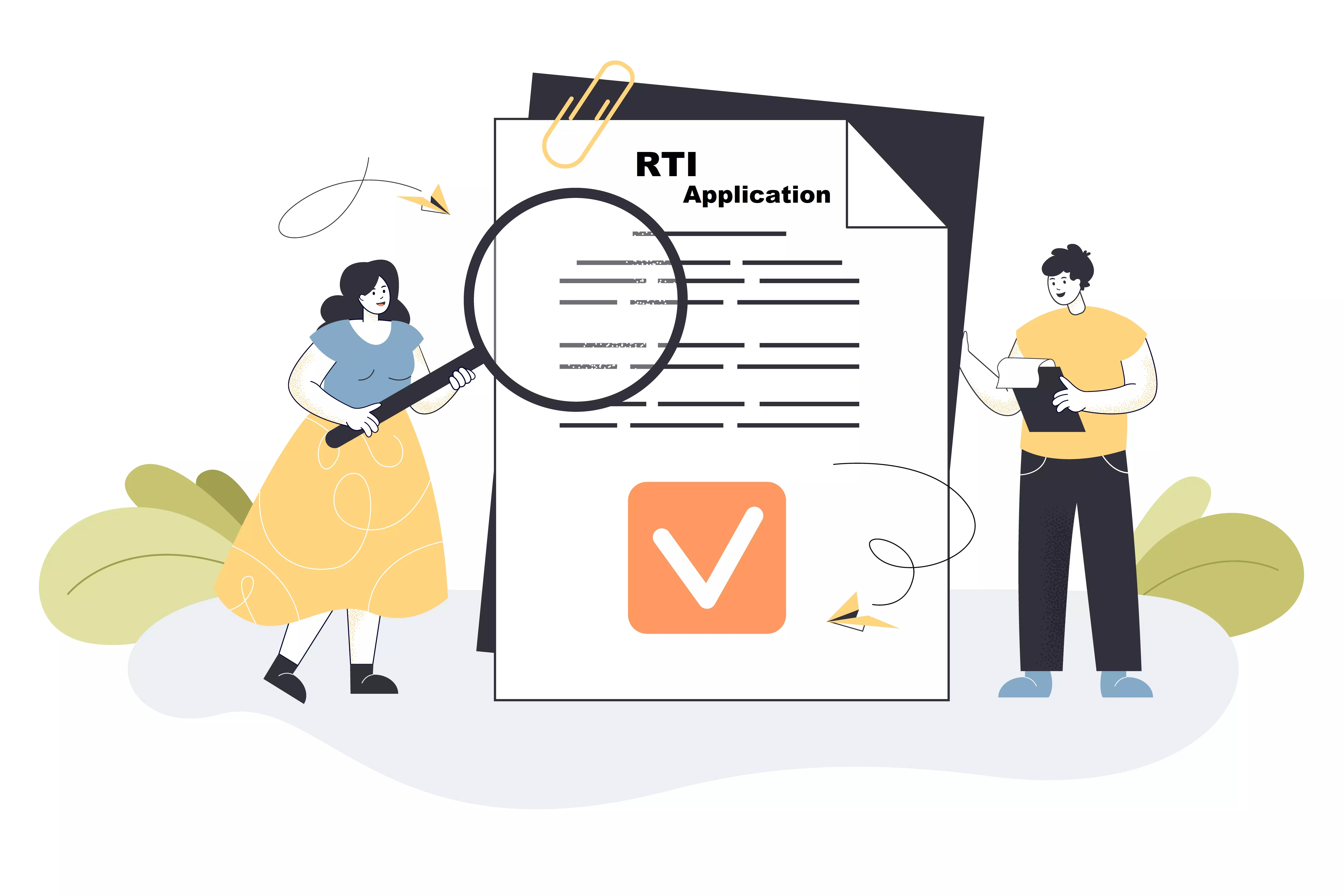Right to Information Act 2005 (Overview) and its Role in Democratic Governance with FAQ
Right to Information Act 2005 and its Role in Democratic Governance with FAQ
The Right to Information Act 2005 (RTI) is a landmark legislation
that empowers the citizens of India to access information held by public
authorities. The Act aims to promote transparency and accountability in
governance and to prevent secrecy and abuse of power. The Act also establishes
Information Commissions at the central and state levels to handle requests,
complaints and appeals related to information.
The RTI Act is based on the principle that democracy requires an
informed citizenry and transparency of information which are vital to its
functioning and also to contain corruption and to hold governments and their
instrumentalities accountable to the governed. The Act recognizes the right to
information as a fundamental right under Article 19 of the Constitution of
India, which guarantees the freedom of speech and expression.
The RTI Act covers all public authorities, which include anybody or institution of self-government established or constituted by or under the
Constitution; by any other law made by Parliament; by any other law made by
State Legislature; by notification issued or order made by the appropriate
Government, and includes any- (i) body owned, controlled or substantially
financed; (ii) non-Government organization substantially financed, directly or
indirectly by funds provided by the appropriate Government.
The RTI Act provides that every citizen has a right to request information from a public authority, and the public authority is obliged to
provide the information within 30 days, subject to certain exemptions and
restrictions. The information can be in any form, such as records, documents,
memos, emails, opinions, advice, press releases, circulars, orders, logbooks,
contracts, reports, papers, samples, models or data material held in any
electronic form.
The RTI Act also mandates that every public authority should
proactively disclose certain categories of information on its website and
through other means, such as the publication of manuals, guides, catalogues,
directories, budgets, programmes, policies, schemes, decisions, norms, rules,
regulations etc. The public authorities are also required to maintain their
records properly and publish annual reports on their implementation of the RTI
Act.
The RTI Act provides for a two-tier mechanism for redressal of
grievances related to information. The first level is the Public Information
Officer (PIO), who is designated by each public authority to receive and
dispose of requests for information. The second level is the Information Commission,
which consists of a Chief Information Commissioner and Information
Commissioners appointed by the President of India at the central level and by
the Governor of the State at the state level. The Information Commission has
the power to hear appeals against the decisions of the PIOs and impose
penalties for violation of the RTI Act. The Information Commission can also
issue directions and recommendations to public authorities for improvement of
their functioning under the RTI Act.
The RTI Act has played a significant role in strengthening
democratic governance in India by enabling citizens to participate more
effectively in decision-making processes and holding public authorities
accountable for their actions. The RTI Act has also exposed various cases of corruption,
maladministration, human rights violations, environmental degradation and
social injustice in various sectors and levels of governance. The RTI Act has
also empowered various marginalized groups such as women, Dalits, tribals,
minorities and persons with disabilities to access their rights and
entitlements under various welfare schemes and programmes.
The RTI Act is widely regarded as one of the most progressive and
citizen-friendly laws in the world. However, there are also some challenges and
limitations in its implementation and impact. Some of these include lack of
awareness among citizens and public officials about the RTI Act; inadequate
infrastructure and resources for effective dissemination and delivery of
information; delay and denial of information by public authorities; harassment
and intimidation of information seekers and activists; misuse and abuse of
exemptions and exceptions under the RTI Act; judicial interference and backlog
in the disposal of appeals and complaints; lack of political will and commitment to
upholding the spirit of the RTI Act; etc.
Therefore, there is a need for continuous monitoring and
evaluation of the implementation and impact of the RTI Act; strengthening of
capacity building and sensitization programmes for citizens and public
officials; promotion of proactive disclosure and digitization of information;
simplification of procedures and formats for seeking and providing information;
protection of information seekers and activists from threats and attacks;
reform of exemptions and exceptions under the RTI Act; harmonization of other
laws with the RTI Act; enhancement of transparency and accountability in
appointment and functioning of Information Commissions; etc.
The Right to Information Act 2005 is a powerful tool for promoting
democratic governance in India. It has enabled citizens to access information
that affects their lives and livelihoods; it has empowered them to question,
challenge and change the policies and practices of public authorities; it has
exposed corruption, inefficiency and injustice in various spheres of
governance; it has facilitated social and economic development and justice for
all. The RTI Act is not only a law but also a movement, a culture and a way of
life. It is the duty and responsibility of every citizen and public authority
to uphold and protect this right and to make it more effective and meaningful.
Frequently asked questions (FAQs) on the Right to Information Act 2005 (RTI):
Q. What is the objective of the RTI Act 2005?
A. The objective of the RTI Act 2005 is to provide for setting out
the practical regime of the right to information for citizens to secure access to
information under the control of public authorities, to promote
transparency and accountability in the working of every public authority, the
constitution of a Central Information Commission and State Information Commissions
and for matters connected therewith or incidental thereto.
Q. What is information as per the RTI Act 2005?
A. Information is any material in any form. It includes records,
documents, memos, e-mails, opinions, advice, press releases, circulars,
orders, logbooks, contracts, reports, papers, samples, models or data material
held in any electronic form. It also includes information relating to any
private body which can be accessed by the public authority under any law for
the time being in force.
Q. What is a public authority as per the RTI Act 2005?
A. A public authority is any authority or body or institution of self-government established or constituted by or under the Constitution; or by
any other law made by the Parliament or a State Legislature; or by notification
issued or order made by the Central Government or a State Government. The bodies
owned, controlled or substantially financed by the Central Government or a
State Government and non-Government organisations substantially financed by the
Central Government or a State Government also fall within the definition of
public authority.
Q. How can a citizen seek information under the RTI Act 2005?
A. A citizen who desires to obtain information under the RTI Act
2005 can make a request in writing or through electronic means in English or
Hindi or in the official language of the area in which the application is being
made, to the Public Information Officer (PIO) of the concerned public
authority. The applicant should provide his name and contact details and
specify the particulars of the information sought. The applicant should also
pay the prescribed fee as per the RTI Rules 2012.
Q. How much fee is required to be paid for seeking information under the RTI Act 2005?
A. A person who desires to seek some information from a Central
Government Public Authority is required to send, along with the application, a
demand draft or a banker’s cheque or an Indian Postal Order of Rs.10/- (Rupees
ten), payable to the Accounts Officer of the public authority as fee prescribed
for seeking information. The payment of the fee can also be made by way of cash to
the Accounts Officer of the public authority or to the Assistant Public
Information Officer against proper receipt. However, no RTI fee is required to
be paid by a citizen who is below the poverty line (BPL), as per RTI Rules 2012.
However, he should submit proof in support of his claim to belong to the
below poverty line. The RTI fee
and mode of payment may vary for different state public authorities.
Q. What is the time limit for providing information under the RTI Act 2005?
A. The PIO is required to provide information within 30 days from
the date of receipt of the request. If the information sought concerns the life or
liberty of a person, it shall be provided within 48 hours. If the request is
transferred to another public authority, an additional time of five days shall be
added to the above response time.
Q. What are the grounds for rejection of the request for information under the RTI Act 2005?
A. The request for information may be rejected by the PIO on any
of the following grounds:
- It does not comply with any provisions of this Act.
- It falls within one of the exemptions specified in section 8 or section 9 of this Act.
- It involves infringement of copyright subsisting in a person other than the State.
- It has been supplied by a third party and has been treated as confidential by that third party.
- It relates to personal information which has no relationship to any public activity or interest, or which would cause unwarranted invasion of privacy.
Q. What are the exemptions from disclosure under section 8 of the RTI Act 2005?
A. Section 8 of the RTI Act 2005 specifies certain categories of
information which are exempt from disclosure unless there is a larger public
interest involved. These include:
- Information affecting the sovereignty and integrity of India, security, strategic, scientific or economic interests of India, relation with foreign states or leading to incitement of an offence.
- Information forbidden by any court of law or tribunal or disclosure of which may constitute contempt of court.
- Information the disclosure of which would cause a breach of privilege of Parliament or State Legislature.
- Information including commercial confidence, trade secrets or intellectual property, the disclosure of which would harm the competitive position of a third party, unless the competent authority is satisfied that larger public interest warrants the disclosure of such information.
- Information available to a person in his fiduciary relationship, unless the competent authority is satisfied that the larger public interest warrants the disclosure of such information.
- Information received in confidence from a foreign government.
- Information the disclosure of which would endanger the life or physical safety of any person or identify the source of information or assistance given in confidence for law enforcement or security purposes.
- Information which would impede the process of investigation or apprehension or prosecution of offenders.
- Cabinet papers including records of deliberations of the Council of Ministers, Secretaries and other officers, except those matters that are expressly referred to in this Act.
- Information which relates to personal information, the disclosure of which has no relationship to any public activity or interest, or which would cause unwarranted invasion of privacy.
Q. What are the remedies available to an applicant if he is not satisfied with the information provided by the PIO?
A. If an applicant is not satisfied with the information provided
by the PIO or does not receive any response within the prescribed time limit,
he can file an appeal before the first appellate authority, who is an officer
senior in rank to the PIO in the same public authority. The appeal should be
filed within 30 days from the date of receipt of a decision of PIO or within 60
days after the expiry of the time limit for response by PIO. The first appellate
authority is required to dispose of the appeal within 30 days or 45 days in
exceptional cases.
If an applicant is not satisfied with the decision of the first
appellate authority or does not receive any response within the prescribed time
limit, he can file a second appeal before the Central Information Commission
(CIC) or State Information Commission (SIC), as the case may be. The second
appeal should be filed within 90 days from the date of receipt of a decision of the first appellate authority or within 120 days after the expiry of the time limit for
response by the first appellate authority. The CIC or SIC, as the case may be, has
the power to hear and decide complaints and appeals and impose penalties on
erring PIOs.











Comments
Post a Comment
Thanks, For Your Valuable Comment